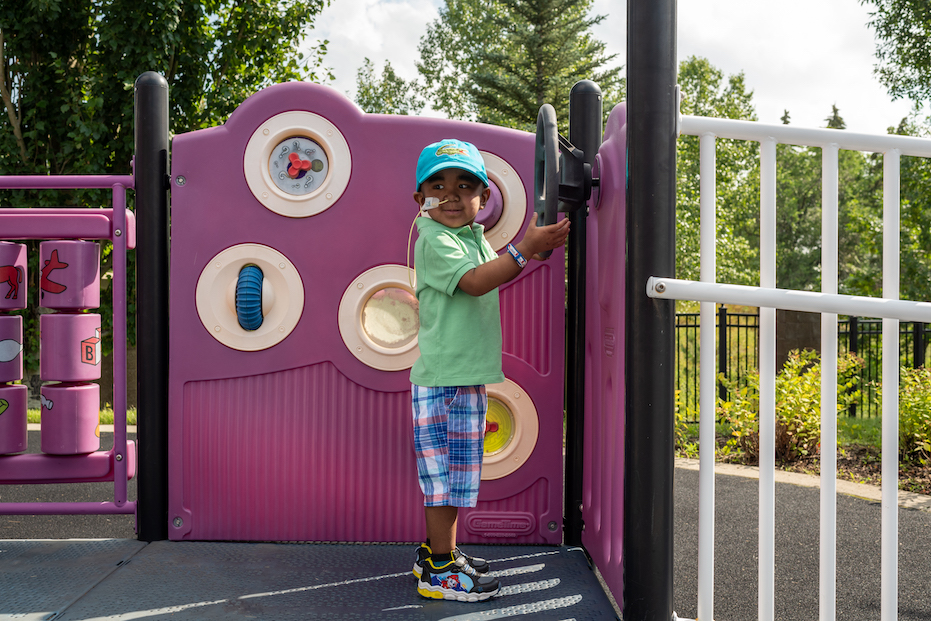The paediatric healthcare system across Canada has been facing significant strain, largely due to being underfunded and undersized. As Canada’s child population continues to grow, so too does the demand for child and youth health services. Add to this over two years of a global pandemic, resulting in cancelled procedures, staff shortages, and increased risk to children’s health and wellbeing – and it is evident why there’s a need to ‘right-size’ the healthcare system to ensure all children receive the care they need.
For Ronald McDonald House Charities (RMHC) across Canada, the challenges faced throughout the healthcare landscape have prompted increased innovation, adaptation, and cooperation to ensure sick children and their families can access the medical care and supports they need. Over the last 40+ years, the RMHC mission to support families has grown and evolved from bed & breakfast style accommodation to family wellness centres found today. RMHC across Canada provides a place for families of sick children to sleep, eat, restore, and receive the support of community. With a well-cared for family by their side, sick children get stronger.
Today, RMHC is part of the fabric of Canada’s paediatric healthcare system and its network of 34 programs across the country serves more than 26,000 families from over 3,400 communities in an average year.

Stronger together
With over 450,000 families supported in the last 40+ years, RMHC across Canada is tightly woven into the communities we serve. From coast-to-coast-to-coast, in addition to having strong relationships with our hospital partners, we work closely with community partners, enabling the expansion of the breadth and depth of our national mission.
Across the country, RMHC mission delivery is a testament to the power of partnerships when it comes to navigating this challenging environment together. There is strength in numbers in what RMHC and the paediatric healthcare system can do for families, together. For example, in Saskatchewan, RMHC Saskatchewan, Saskatchewan Health Authority and Victoria Hospital Foundation came together to introduce a new RMHC Family Room space in the NICU at Prince Albert Hospital, including 24/7 access to healthy, nutritious food for families, providing caregivers with essential rest and respite just steps away from bedside.
With the rate of inflation continuing to rise along with the cost of necessities like groceries – providing fresh and nutritious meals to families has never been more important. In fact, in 2022 RMHC across Canada served an impressive 300,000 meals – more than ever before.
“With a sick child, it’s not every day that we’re in the ideal state of mind to look after the kids perfectly. This place, and the meals – it takes care of everything.” – Ashmawy Family, 280 nights, RMHC BC & Yukon.

Catering to unique and individual needs
Part of right-sizing the system also means acknowledging the unique needs of families as they navigate caring for a seriously ill child. 15% of RMHC families in Canada report at least one family member navigating a mental health challenge at the time of their stay at RMHC. More than a place to say, RMHC programming has evolved over the years to encompass the overall health and wellbeing of families – including music therapy, art therapy, and pet therapy. Dedicated spaces have also been created at Ronald McDonald House programs across the country to support mental health and wellness such as community gardens, wellness rooms, and meditation spaces.
With this evolution in programming, staff training has been at an all-time high over the past year. Mental Health First Aid, Traits of an Inclusive Leader, The Construct of Race, and How to be an Ally are among the training sessions that have been conducted across the country to support and equip staff to better support families.
Growing to support more families
While RMHC across Canada is providing more support to families than ever before, the reality is that every 20 minutes, a family arrives at an RMHC doorstep, and we currently cannot meet the demand for our support. In fact, we estimate we’re meeting just 20% of the need for our House Program across Canada.
To ensure no family is turned away and every child can access the medical care they need, RMHC has ambitious plans to grow across the country, with a goal to double in size in the next 10 years from 554 to 947 bedrooms.
“As RMHC across Canada is only able to support 20% of the need today, growing our programming and number of bedrooms across the country is critical to ensure we can keep pace, continue to be there for more families who need us, and support our paediatric partners in ensuring access to the healthcare families need,” says Kate Horton, CEO, RMHC Canada.
Most recently, this growth has come to life through RMHC Manitoba in 2022, which more than doubled its capacity from 14 to 40 bedrooms. This June, a new RMHC Family Room opened at CHU Ste. Justine in Montreal to support families within hospital walls. As we look to the near future, in 2024, a new House will open in Halifax, and the House in Ottawa will expand. In 2025, the House in Calgary will expand, and two new Houses will open in Prince Albert and Regina,
Saskatchewan.
Continuing the conversation
We look forward to continuing the conversation on how together, we can support the paediatric healthcare system on the journey to right-sizing across the country, at this year’s Children’s Healthcare Canada Annual Conference. Join our session on December 5 at 9:10 PT to hear what right-sizing means for primary care, mental health services, emergency care, surgery, research, community partners, and families with sick children.
To learn more about RMHC across Canada or to make a donation, visit: rmhc.ca.


![Aug312022-RMHCanada-0413[5]](https://hospitalnews.com/wp-content/uploads/2023/07/Aug312022-RMHCanada-04135-696x464.jpg)